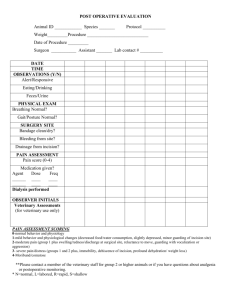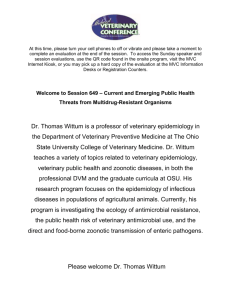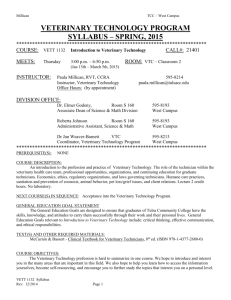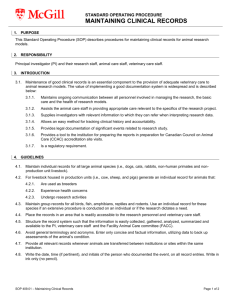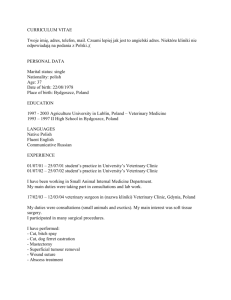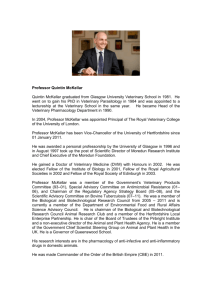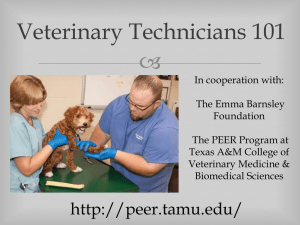VETT_2333_401_21428_201520_Barnett_J
advertisement
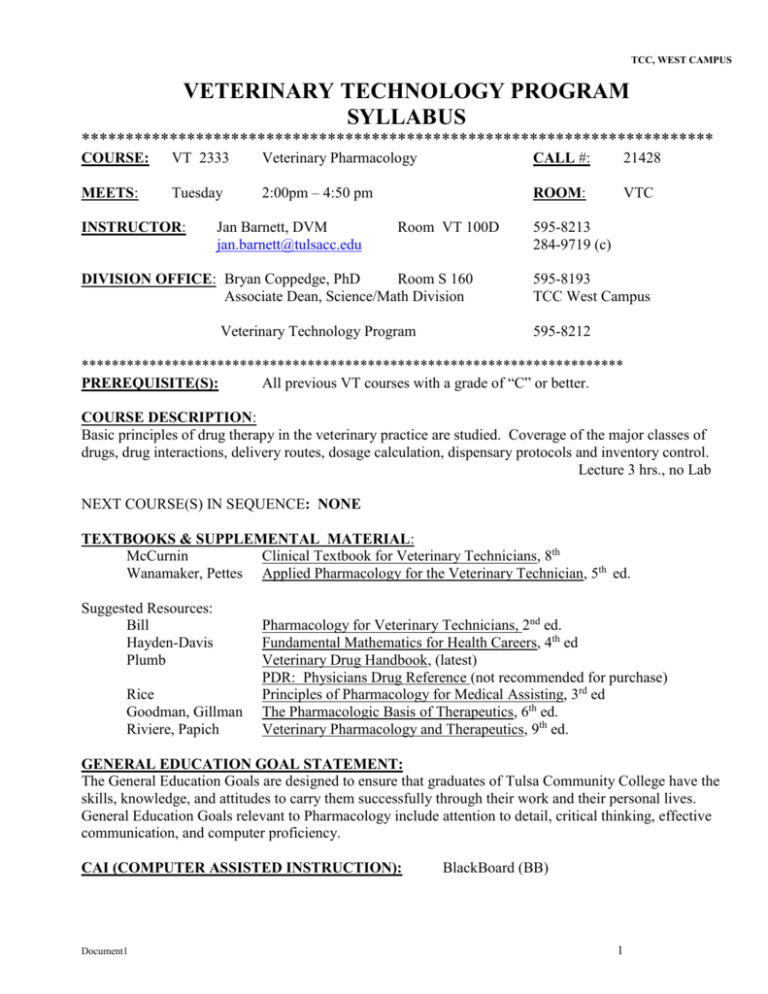
TCC, WEST CAMPUS VETERINARY TECHNOLOGY PROGRAM SYLLABUS ************************************************************************ COURSE: VT 2333 Veterinary Pharmacology CALL #: 21428 MEETS: Tuesday 2:00pm – 4:50 pm ROOM: VTC INSTRUCTOR: Jan Barnett, DVM jan.barnett@tulsacc.edu Room VT 100D DIVISION OFFICE: Bryan Coppedge, PhD Room S 160 Associate Dean, Science/Math Division Veterinary Technology Program 595-8213 284-9719 (c) 595-8193 TCC West Campus 595-8212 ************************************************************************ PREREQUISITE(S): All previous VT courses with a grade of “C” or better. COURSE DESCRIPTION: Basic principles of drug therapy in the veterinary practice are studied. Coverage of the major classes of drugs, drug interactions, delivery routes, dosage calculation, dispensary protocols and inventory control. Lecture 3 hrs., no Lab NEXT COURSE(S) IN SEQUENCE: NONE TEXTBOOKS & SUPPLEMENTAL MATERIAL: McCurnin Clinical Textbook for Veterinary Technicians, 8th Wanamaker, Pettes Applied Pharmacology for the Veterinary Technician, 5th ed. Suggested Resources: Bill Hayden-Davis Plumb Rice Goodman, Gillman Riviere, Papich Pharmacology for Veterinary Technicians, 2nd ed. Fundamental Mathematics for Health Careers, 4th ed Veterinary Drug Handbook, (latest) PDR: Physicians Drug Reference (not recommended for purchase) Principles of Pharmacology for Medical Assisting, 3rd ed The Pharmacologic Basis of Therapeutics, 6th ed. Veterinary Pharmacology and Therapeutics, 9th ed. GENERAL EDUCATION GOAL STATEMENT: The General Education Goals are designed to ensure that graduates of Tulsa Community College have the skills, knowledge, and attitudes to carry them successfully through their work and their personal lives. General Education Goals relevant to Pharmacology include attention to detail, critical thinking, effective communication, and computer proficiency. CAI (COMPUTER ASSISTED INSTRUCTION): Document1 BlackBoard (BB) 1 COURSE OBJECTIVES: The student will understand, properly calculate, prepare, administer and dispose of pharmaceutical agents for various animal species. The student will understand, properly monitor and record normal and abnormal reactions to therapeutic agents for various animal species. AVMA ESSENTIAL and RECOMMENDED TASKS: Required tasks are denoted by an asterisk (*) PHARMACY and PHARMACOLOGY Administration Skill: Safely and effectively administer prescribed drugs to patients. Tasks: Prepare medications; label and package dispensed drugs correctly* Read and follow veterinarian’s pharmacy orders* Recognize groups of drugs, their mechanisms, and clinically relevant side effects* Recognize the safe and effective manner in which vaccines must be administered; recognize and explain common side effects* Accurately perform appropriate calculations; use weights and measures correctly* Safely and effectively administer drugs by common parenteral and enteral routes; be able to explain appropriate routes and methods* Monitor therapeutic responses* Demonstrate the ability to accurately record medical information* Demonstrate understanding of regulations governing maintenance of controlled substances log book* Demonstrate compliance with all federal regulatory guidelines for drug purchase, storage, administration, withdrawal, dispensing, disposal, and inventory control (e.g., biologics and therapeutic agents, pesticides, and hazardous wastes)* Decision-making abilities: Given the characteristics of the patient, the instructions of the veterinarian and the medication to be used, the veterinary technician will calculate the correct amount of medication in the prescribed form and administer it by the prescribed route to maximize therapeutic benefits and minimize the potential for adverse effects. The veterinary technician shall also be able to differentiate between abnormal and normal responses to medication. Dispensing Skill: Accurately dispense and explain prescribed drugs to clients. Tasks: Given a drug order, properly prepare medications for dispensing, including performing accurate calculations* Demonstrate compliance with regulations governing prescription drugs versus over-the-counter drugs* Demonstrate understanding of regulations governing maintenance of controlled substances log book* Demonstrate compliance with all federal regulatory guidelines for drug purchase, storage, administration, withdrawal, dispensing, disposal, and inventory control (e.g., biologics and therapeutic agents, pesticides, and hazardous wastes)* Relay drug information to clients (e.g., handling, storage, administration, side-effects, drug interactions, safety, reasons for use of drug) * Decision-making abilities: Given the characteristics of the patient, the instructions of the veterinarian and the medication to be used, the veterinary technician will (1) calculate and dispense the correct form and dose of medication and (2) communicate necessary client information in order to maximize safety, Document1 2 compliance with prescribed therapy and successful treatment of the patient. The veterinary technician should also be proficient at performing inventory control procedures. Communication Skill: Communicate in a professional manner in all formats – written, oral, non-verbal, and electronic. Tasks: Recognize the legality of the veterinary-client-patient relationship* Develop and provide client education in a clear and accurate manner at a level the client understands (i.e., oral and written form, including educational handouts) * Decision-making abilities: Taking into account the patient, client, staff and circumstances, the veterinary technician will effectively and accurately acquire and convey information utilizing an appropriate communication mode. Laws and Ethics Skill: Follow and uphold applicable laws and the veterinary technology profession’s ethical codes to provide high quality care to patients. Tasks: Understand and observe legal boundaries of veterinary health care team members* Interact professionally with clients and fellow staff members* Demonstrate a commitment to high quality patient care* Respect and protect the confidentiality of client and patient information* Decision-making abilities: Given knowledge of legal limitations and applicable ethical standards, the veterinary technician will carry out her/his duties within appropriate legal boundaries and maintain high ethical standards to provide high quality service to clients, patients, employers and the veterinary profession. TEACHING METHODS: Course material will be presented by lecture, BB (blackboard), group discussion/projects and reading assignments. It is very important you keep up weekly. The course will follow the text in a system by system approach. It will cover the broad groups and classifications of pharmaceuticals, then progress to specific pharmacologic agents. Student discussion is encouraged and is required. A solid foundation in functional physiology is essential to understand the principles and effects of pharmacologic agents. Students are strongly urged to review the physiology of each organ system during each module. Emphasis is on the major species -large and small animals. Field trips: Transportation to and from field trips and any off-site locations are the student's responsibility. EVALUATIONS AND GRADING: Late assignments / make-ups policies – Late assignments are graded at 1/2 off earned grade (maximum possible 50%) if submitted within 1 week of due date. Late assignments past 1 week receive a zero (0) grade. Exception: prior approval of instructor. Make up exams by approval of Instructor and taken within 1 week, at the ACS testing office. Makeup exams may be of various formats and Instructor reserves the right to give an “all essay” as makeup. There are 600 points earned through periodic exams, quizzes, and group discussion/projects. Additionally, there is a 200-point comprehensive final--you are permitted one 3x5 index card, front/back for the final, which is turned in with the exam. Examinations, quizzes, BB assignments and group discussion/projects will include material presented during lecture and assigned reading/study. Material presented by guest speakers will also be covered on examinations. Research Assignment will constitute 100 points. Document1 3 BlackBoard assignments and Pop Quizzes will total up to 200 points. There are several homework and group participation assignments throughout the semester. Exams Rsch Assign BB/Quiz Final Exam Total 600 100 200 200 1,100 90 % + 89 – 80% 79 – 70% 69 – 60% < 60% A B C D F ATTENDANCE POLICIES Attendance will be taken at every class. Anticipated absences must be arranged with the instructor and/or Program Coordinator. Regular class attendance is important not only from the standpoint of learning, but is a must to be successful in this course. Students are held responsible for all materials covered during their absence and any changes made in the agenda. An Excessive Absence notice will be issued after a student accumulates the equivalent of 4 missed class periods OR is not maintaining a “C” average for the class. The Excessive Absence notice will automatically notify the Financial Aid office and Veterans Services, if applicable. The student may also be subject to Administrative Withdrawal (AW) for non-attendance. WITHDRAWAL, AUDIT, AND INCOMPLETE POLICY To withdraw from the class, the student should initiate an official withdrawal through the counseling office; non-attendance DOES NOT constitute official withdrawal. Failure to withdraw may result in the student receiving a regular grade of “F” at the end of the semester. To request a change to Audit (AU) or Incomplete (I), the student must be maintaining a passing grade. The student must initiate the change with the instructor and sign the audit or incomplete agreement. If the Incomplete is due to a circumstance that prevents the student from being able to sign the form him/herself, the instructor may make other arrangements. The last date to withdraw or change to audit –consult College Catalog &/or online. READING & WRITING TUTORING SERVICES The Technology Learning Center’s Reading & Writing Services helps student’s build analytic reading, solid research and effective writing skills. Additionally, Reading & Writing Services can supplement classroom instruction with information on MLA, APA, or Chicago Manual styles, Internet research strategies, source evaluation and documentation methods, and essay writing techniques. Hours: consult TLC for hours of operation and to make an appointment. INCLEMENT WEATHER AND CLASS CANCELLATION POLICY When severe winter weather hits, you may assume that TCC will be open for classes unless it is announced otherwise on television, radio stations,on the TCC web site and via TCC ALERT. TCC does not automatically close if Tulsa Public Schools close. If your instructor decides individually to cancel class because of inclement weather or other unexpected reasons, your instructor will contact you. It is important that TCC and your instructor have current contact information so you can be notified if necessary. Notify the TCC Registrar’s office and your instructor if your contact information changes during the semester. PLAGIARISM POLICY Deliberate plagiarism is claiming, indicating, or implying that the ideas, sentences, or words of another writer are your own; it includes having another writer do work claimed to be your own, copying the work Document1 4 of another and presenting it as your own, or following the work of another as a guide to ideas and expression that are then presented as your own. At the instructor’s discretion, a student guilty of deliberate plagiarism may receive a zero for the assignment and an “F” in the course. Accidental plagiarism is the handling of quotations and paraphrases without a deliberate attempt to deceive; it includes failing to mark the beginning of paraphrases, failing to get away from the language of the original text when paraphrasing, failing to mark quotations with properly placed quotation marks, and failing to properly identify the source of a quotation or paraphrase. At the instructor’s discretion, a student whose paper contains accidental plagiarism may have the opportunity to rewrite the paper with a reduction in grade. ACADEMIC DISHONESTY OR MISCONDUCT Academic dishonesty or misconduct is not condoned nor tolerated at campuses within the Tulsa Community College system. Academic dishonesty is behavior in which a deliberately fraudulent misrepresentation is employed in an attempt to gain undeserved intellectual credit, either for oneself or for another. Academic misconduct is behavior that results in intellectual advantage obtained by violating specific standard, but without deliberate intent or use of fraudulent means. Academic dishonesty or misconduct cases are governed by the Campus Student Rights and Responsibilities Code (see Student Conduct Handbook). COMPUTER SERVICES ACCEPTABLE USE Access to computing resources is a privilege granted to all TCC faculty, staff, and students. Use of TCC computing resources is limited to purposes related to the College’s mission of education, research, and community service. Student use of technology is governed by the Computer Services Acceptable Use Statements/Standards found in the TCC Student Code of Conduct Policy Handbook. These handbooks may be obtained by contacting any Student Activities or Dean of Student Services office. CLASSROOM ETIQUETTE All classroom and lab areas are to be cleaned and organized before leaving class. Cell phones are to be turned off during lab and lecture unless special arrangements are made. INSTITUTIONAL STATEMENT Each student is responsible for being aware of the information contained in the TCC Catalog, TCC Student Handbook, and semester information listed in the Class Schedule. DISABILITY RESOURCES: It is the policy and practice of Tulsa Community College to create inclusive learning environments. Accommodations for qualifying students in compliance with the Americans with Disabilities Act (ADA) and Section 504 of the Rehabilitation Act are available. To request accommodations, contact the Education Access Center (EAC) at eac@tulsacc.edu or call (918) 595-7115 (Voice). Deaf and hard of hearing students may text (918) 809-1864 TOBACCO FREE COLLEGE Tulsa Community College is a Tobacco Free college in accordance with the Governor’s Executive Order 2012-01 and Title 63 of the Oklahoma Statutes, Section 1-1523 which prohibits smoking or the use of any tobacco products in all public places, in any indoor workplace, and all vehicles owned by the State of Oklahoma and all of its agencies and instrumentalities. This Order includes property leased, rented, or owned by TCC including, but not limited to, all grounds, buildings, facilities, and parking lots. Tulsa Community College’s policy includes a tobacco free environment on all campus and off-campus locations conducting TCC credit or non-credit classes. The TCC Campus Police is responsible for ensuring compliance with the Tobacco-Free Environment Policy. Violations of the policy may be addressed through issuance of campus or state citations Document1 5 LECTURE SCHEDULE WEEK 1 DATE 1/13/15 TOPIC Introduce Syllabus Pharmacology References and their use READING Demo: Lifelearn CD ROM (Client Handouts, Pharmacy skills); Evolve® Intro to Pharmacology Regulations and Record Keeping Controlled Substances WP: Chap 1, Apdx D Mc: Ch 23 ACT Video: Pharmacy Skills Part 1 Inventory WP: Ch 19 HO: Calculations #1 Principles of Pharmacology and Pharmocokinetics: therapeutic range, dosage regimen and routes; drug distribution, biotransformation, and elimination 2 Document1 1/20/15 WP: Chap 1, 2 Dosage Calculations: Common fractions, decimal fractions, exponents & scientific notation, metric measure, percents & percent calculations WP: Chap,3 Routes and Techniques of Drug Administration: routes, preparing prescriptions, dispensing, storing and handling drugs, drug compounding WP: Chap 2 Mc: Ch 23 S: pertaining chapters DVD: ACT Pharmacy Skills Part 2,3 (dosages/calculations) Pharmacy Labeling WP: Chap 1, 2, Apdx F 6 3 4 1/27/15 2/3/15 Antiparasitics: principles Endoparasites: nematodes, cestodes, heartworm, protozoa Ectoparasites: Chlorinated hydrocarbons, organophosphates/carbamates, pyrethrins/pyrethroids, amitraz, imidacloprid, fipronil, insect growth regulators, insect repellants EXAM # 1 (week 1-3) Anti-infectives: types, goals of therapy, resistant microorganisms,concern with residues, mechanisms of microbial action,specific drugs (antibiotics, antifungal, antiviral, immune modifiers, interferon) WP: Chap 13 Mc: Ch 23 Individual Activity- Charts of Agents and Charts for each Species/parasite -- Due Feb 8 Friday NLT 1600hr WP: Chap 12 Mc: Ch 23 Classes of Antimicrobials: penicillin, cephalosporins, bacitracins,aminoglycosides, quinolones, tetracyclines, sulfonamides & potentiated sulfonamides, macrolids (lincomycin) 5 2/1015 Sanitation & Disinfectants (from VETT 2224 Microbiology) Micro text and Dr. B HO’s Renal Drugs: diuretics, ACE inhibitors, Vasodilators ** Acute and Chronic renal failure ** Hosp 2 info also !! ** WP: Ch 6 Mc: Ch 23 Urinary tract Pharmaceuticals: diuretics, pH modifiers, Stimulants; Urolithiasis 6 2/17/15 Mc: p466-67, 469, 471, 495, 818-820, 980-82, 992-94 ** Hosp 2 info also !! ** WP: Chap 7 Mc: Ch 23 Cardiovascular Drugs: normal cardiac function, antiarrhythmics, inotropes, vasodilators, diuretics Blood modifiers, Anticoagulants Document1 WP: Ch 16 (325-333) 7 7 8 2/24/15 EXAM # 2 (weeks 4-6) GI Drugs: function/control of GI tract, emetic & antiemetic, antidiarrheal, antacids & anti-ulcer, stimulant/laxative/enema/lubricants/stool softeners, digestive aids, oral/dentrifice, ruminatorics & antibloat medications WP: Chap 8 Mc: Ch 23 3/3/15 ** Review from Hosp 2 ** WP: Chap 9 Mc: Ch 23 Drugs Affecting the Endocrine System: negative feedback, thyroid, endocrine pancreatic drugs (diabetes), estrus modifiers, growth promoters, anabolic steroids Fluid Therapy Blood Transfusion, Isoerythrolysis 9 3/10/15 10 3/17/15 11 3/24/15 SPRING BREAK 12 3/31/15 EXAM # 3 (Weeks 7-11) Ophthalmic and Otic Pharmaceuticals 13 4/07/15 Respiratory Drugs: antitussive, mucolytics, expectorants WP: Chap 5 decongestants, bronchodilators Mc: Ch 23 14 4/14/15 Drugs Affecting the Nervous System: anesthetics, tranquilizers, analgesics, anticonvulsants, controlled drugs, antitussives, behavior modification, CNS stimulants, euthanasia 15 Document1 4/21/15 WP: Ch 15 Mc: p 793-6; HO Dermatologic Pharmaceuticals: antiseborrheics, humectants, antipruritics, antiseptics, wound healing, anti-infectives, supplements, caustics WP: Chap 11 Mc: Ch 23 WP: Chap 10 Mc: Ch 23 WP: Chap 4; Ch 18 p 380-end Mc: Ch 23 ** classroom focus on therapy vs anesth; however, I will test on all !! **** WP: Chap 14 Mc: Ch 23 EXAM # 4 (weeks 12-14) Pain and Anti-inflammatories: inflammation pathway, antiprostaglandins, NSAIDS, corticosteroids, glucocorticoids, disease caused by glucocorticoids 8 16 4/28/15 COMPREHENSIVE FINAL 17 5/05/15 Antineoplastic (antineoplastic, immunosuppressant) Immunologic and Vaccines WP: Ch 16, Ch 17 Mc: Ch 23 Toxicology; Miscellaneous Antidotes WP: Ch 18 Mc: Ch 27 Alternative and Nutraceuticals WP: Chap 18 Mc: Ch 23 WP: Wannamaker, Pettes, Applied Pharmacology for the Veterinary Technician, 5th Mc: McCurnin, Textbook for Veterinary Technology S: Stumpf, Mathematics for Veterinary Medical Technicians, 3rd ed HO = handouts/homework via BlackBoard and other Note: there are several calculation assignments distributed throughout the semester, due: TBA Document1 9


